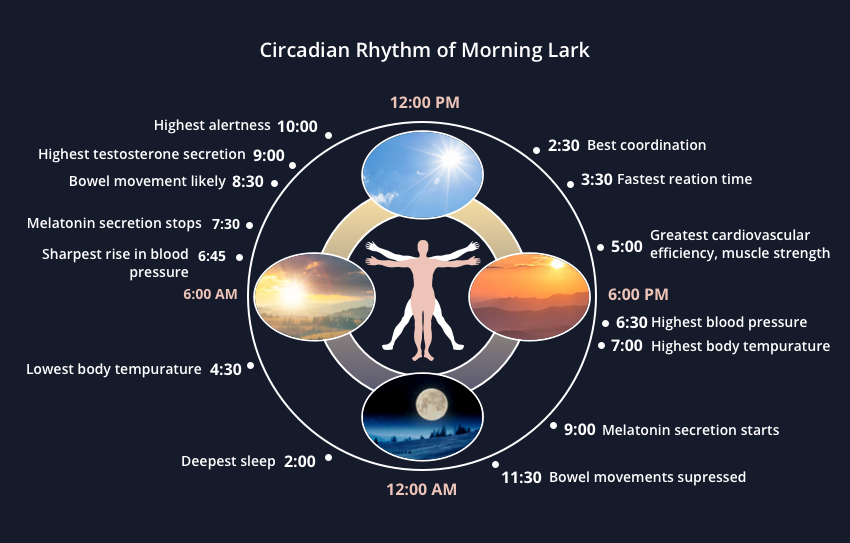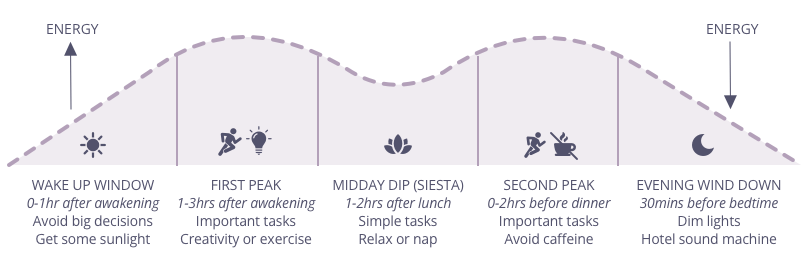What to Do on the Day After Daylight Savings Time
So its daylight savings and you've lost an hour of sleep, now what...
By Dr. Dan Gartenberg
Solving Daylight Savings Time: A Science Backed Approach
On Daylight savings clocks will "spring forward" for Daylight Saving Time (DST) in the U.S., meaning you lose an hour of sleep. This can disrupt your circadian rhythm, making you feel groggy and fatigued the next day.The sudden time change can lead to:
-
Increased grogginess and fatigue
-
A temporary drop in alertness and cognitive function
-
Increased risk of heart attacks, strokes, and workplace accidents (studies show a spike in these events right after DST)
-
Difficulty falling asleep at night and waking up in the morning
The goal of these science-backed tips is to help your body adjust faster, minimize fatigue, and reset your internal clock as efficiently as possible. Let’s dive into how each behavior works on a physiological level.

1. Get Morning Sunlight ☀️ (Reset Your Circadian Rhythm Faster)
🔬 The Science:
Your body relies on light exposure to regulate melatonin, the hormone that controls sleep-wake cycles. Sunlight in the morning signals your brain (via the suprachiasmatic nucleus in the hypothalamus) to stop melatonin production and increase cortisol (a hormone that promotes wakefulness).
🔑 How to Apply It:
- Get 20–30 minutes of sunlight as early as possible.
- If sunlight isn't available, bright artificial light therapy can help.
🧠 The Benefit:
Sunlight helps your brain shift to the new time zone faster, reducing grogginess and making it easier to fall asleep at night.

2. Avoid Oversleeping or Long Naps (Prevent Jet Lag Effects)
🔬 The Science:
Sleeping in tricks your body into thinking it’s still on the old schedule and delays circadian adjustment. Likewise, long naps interfere with homeostatic sleep drive, the biological pressure to sleep that builds throughout the day.
🔑 How to Apply It:
- Wake up at your usual time, even if you’re tired.
- If you must nap, keep it short (20–30 minutes) and before 3 PM to avoid disrupting nighttime sleep.
🧠 The Benefit:
Keeping a consistent wake time helps the brain adjust faster, reducing the "jet lag" effect of DST.
3. Eat a Protein-Rich Breakfast (Regulate Energy and Alertness)
🔬 The Science:
Your first meal of the day influences neurotransmitter balance and blood sugar stability. Proteins provide tyrosine, an amino acid needed to produce dopamine and norepinephrine—chemicals that enhance alertness and focus.
🔑 How to Apply It:
- Opt for eggs, yogurt, nuts, or lean meats instead of pastries or sugary cereals.
- Avoid high-carb or high-sugar breakfasts that cause glucose spikes and crashes.
🧠 The Benefit:
A protein-rich breakfast keeps you mentally sharp and prevents the mid-morning energy dip caused by blood sugar fluctuations.
4. Move Your Body (Boost Energy & Mood with Endorphins)
🔬 The Science:
Physical activity, especially in the morning, increases blood flow, oxygen delivery, and endorphin production, helping combat sleep inertia (the grogginess from disrupted sleep). Exercise also raises core body temperature, signaling wakefulness to your brain.
🔑 How to Apply It:
- Take a 10–20 minute brisk walk in the morning.
- Engage in light stretching or yoga if feeling sluggish.
- Avoid intense workouts late at night, as they increase cortisol and delay sleep.
🧠 The Benefit:
Exercise energizes your body and mind by increasing alertness, reducing stress, and promoting better sleep later.
5. Limit Caffeine After Midday (Avoid Sleep Disruptions at Night)
🔬 The Science:
Caffeine blocks adenosine, a neurotransmitter that builds up throughout the day and makes you feel sleepy. Since caffeine has a half-life of 5–7 hours, consuming it too late can delay melatonin production and make it harder to fall asleep.
🔑 How to Apply It:
- Have your last cup of coffee or tea by 2 PM.
- If you need an afternoon boost, opt for green tea (contains L-theanine, which helps with focus without the jitters).
🧠 The Benefit:
Avoiding late-day caffeine ensures that melatonin can rise naturally, making it easier to fall asleep and stay asleep.

6. Stay Hydrated (Prevent Fatigue and Brain Fog)
🔬 The Science:
Mild dehydration can cause fatigue, headaches, and reduced cognitive function. When you’re sleep-deprived, your body loses more water due to increased cortisol and metabolic activity.
🔑 How to Apply It:
- Drink water throughout the day.
- Limit alcohol and excessive caffeine, especially after 2 PM, as both contribute to dehydration.
🧠 The Benefit:
Staying hydrated prevents energy dips and keeps your brain functioning optimally.

7. Avoid Heavy Meals Before Bed (Optimize Digestion and Sleep Quality)
🔬 The Science:
Eating large or high-fat meals late at night activates digestion and metabolism, which can keep you alert instead of relaxed. Spicy foods can also cause acid reflux, further disrupting sleep.
🔑 How to Apply It:
- Finish eating at least 2–3 hours before bed.
- Opt for light, easily digestible snacks like a banana or almonds if hungry.
🧠 The Benefit:
A light dinner prevents digestive discomfort and allows melatonin to rise without interference.

8. Dim the Lights in the Evening (Encourage Natural Melatonin Production)
🔬 The Science:
Exposure to blue light from screens suppresses melatonin by tricking your brain into thinking it’s still daytime. Reducing light exposure at night allows your body to naturally prepare for sleep.
🔑 How to Apply It:
- Lower screen brightness and enable night mode on devices.
- Use warm, dim lighting in the evening.
- Read a physical book instead of scrolling on your phone.
🧠 The Benefit:
Dimming lights supports melatonin production, making it easier to fall asleep and adjust to DST faster.

9. Go to Bed on Time (Even If You’re Not Tired)
🔬 The Science:
Your circadian rhythm adjusts based on habitual sleep patterns. Going to bed late delays melatonin release, making it even harder to wake up the next morning.
🔑 How to Apply It:
- Stick to your usual bedtime, even if you're not tired.
- If struggling to fall asleep, try reading, meditation, or deep breathing instead of looking at a screen.
🧠 The Benefit:
A consistent sleep schedule helps your body recalibrate to the new time faster.

